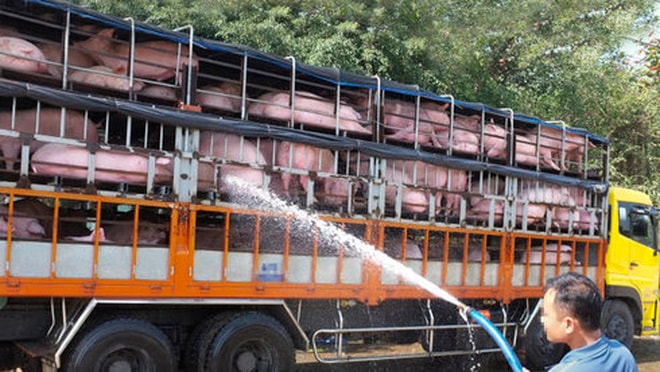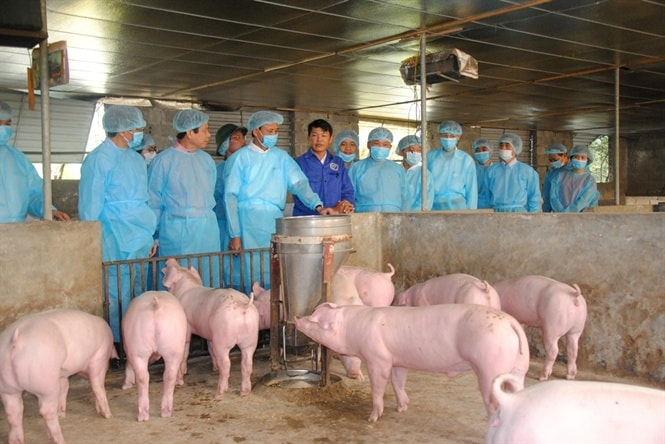High risk of African swine fever spreading to Vietnam
More than 1 million pigs have been culled worldwide due to African swine fever. Neighboring China has reported a total of 105 outbreaks in 25 provinces, and more than 950,000 pigs have been culled.
According to information from the World Organization for Animal Health (OIE), from 2017 to February 14, 2019, 20 countries have reported African swine fever. In total, more than 1 million pigs have been forced to be destroyed.
In China, according to information from the OIE and the Food and Agriculture Organization of the United Nations (FAO), from August 3, 2018 to February 14, 2019, China announced a total of 105 outbreaks in 25 provinces, with more than 950,000 pigs forced to be destroyed.
In addition, on January 17, 2019, a dead pig was found on Mudanjiang Island (uninhabited island, deserted island), Lien Giang, Taiwan (China) and tested positive for African swine fever. The gene sequencing results of this virus were 100% similar to the African swine fever virus in China.
 |
| Prevent the risk of African swine fever entering Vietnam. |
Mr. Dam Xuan Thanh, Deputy Director of the Department of Animal Health (Ministry of Agriculture and Rural Development) commented that currently, African swine fever is spreading very quickly in the world from countries such as the Russian Federation to China, Taiwan (China) and Mongolia, so the risk of the disease spreading to Vietnam and other countries is very high.
Currently, border residents between Vietnam and other countries have many trading and traveling activities (especially in some localities such as Quang Ninh, every day there are more than 10,000 people crossing the border between the two countries); the number of vehicles and means of transport is large, so it is very possible to bring the African swine fever virus into Vietnam.
The number of tourists from other countries traveling to Vietnam by road, air and sea is very large, especially tourists from Asian countries who often have the habit of bringing food containing pork, which can bring African swine fever pathogens into Vietnam...
To prevent African swine fever, the Department of Animal Health recommends that localities promptly and effectively implement measures. Closely monitor border gates, trails, and border crossings for people and vehicles entering Vietnam from countries with African swine fever... Closely monitor places where pigs are traded, slaughtered, and transported...
Building two scenarios to respond to the epidemic
To respond to African swine fever, Mr. Dam Xuan Thanh, Deputy Director of the Department of Animal Health, said that the Department has currently developed a draft scenario for information and response to African swine fever. For small outbreaks, samples should be taken promptly for testing to take measures. Samples should be sent to the OIE to confirm the exact cause of African swine fever.
While waiting for test results, the Department of Animal Health established 8 rapid response teams to immediately go to the locality where the samples were sent to investigate, grasp the situation and guide measures to handle, prevent and control the spread of disease and prevent over-selling.
When there is a positive test result for African swine fever, it is forbidden to treat sick pigs, pigs suspected of being sick and immediately carry out the destruction of sick pigs. In case of an outbreak in a household, farm, small-scale breeding facility without separate barns or markets, pig trading points, pig products, pig slaughterhouses, the entire herd will be destroyed within 24 hours from the time the test result confirms positive for African swine fever.
 |
| When testing positive for African swine fever, prohibit the treatment of sick pigs or pigs suspected of having the disease and immediately carry out the destruction of sick pigs. |
The destruction is also applied to herds adjacent to the positive herd but have not been sampled for testing. In epidemic areas and areas threatened by epidemics, within 48 hours, the destruction is applied to sick herds with clinical symptoms of African swine fever without necessarily waiting for test results to prevent the disease from spreading and spreading widely.
For large-scale farms with many separate rows of barns, destroy all pigs in the barn and the row of barns with sick pigs. Apply biosecurity measures and take regular samples for monitoring in the remaining rows of barns. If found positive or there is a high risk of infection, destroy the entire farm. Isolate the outbreak area, disinfect, stop transporting pigs and pig products. Monitor the epidemic...
When an epidemic is detected on a large scale, with positive test results in affected households in the same commune-level unit, the remaining pig herds of households and farms in the same commune, commune group, district group and the entire province will be destroyed immediately without testing...
For epidemic areas such as communes, wards and towns where there is an outbreak, the authorities will carry out general cleaning and disinfection once a day for the first week; 3 times a week for the next 2-3 weeks.
For areas threatened by the epidemic within a 3 km radius around the outbreak, carry out general cleaning and disinfection continuously once a day for the first week; 3 times a week for the next 2-3 weeks. For the same mattress within a 10 km radius around the outbreak, carry out general cleaning and disinfection with a frequency of once a week continuously for 1 month from the outbreak.
Deputy Minister of Agriculture and Rural Development Phung Duc Tien said that the risk of H5N1, H7N9, African swine fever... being transmitted by smuggling at the border is very high. The development of epidemics is complicated but in many places local authorities have not yet taken action, inspection of foot and mouth disease, propaganda on compensation for people is very slow, although the policy has been in place for a long time, people are completely unaware of the compensation policy; therefore, it is necessary to review the way of doing things.
